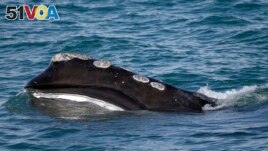29 January 2022
Scientists say genetic testing of baby whales and their mothers can provide better information about endangered whales.
They say more detailed genetic information could increase the chances of saving whales from disappearing.
Researchers from the New England Aquarium in Boston, Massachusetts, published their findings in Mammalian Biology.

In this March 28, 2018 file photo, a North Atlantic right whale feeds on the surface of Cape Cod Bay off the coast of Plymouth, Massachusetts. (AP Photo/Michael Dwyer, File)
The researchers studied the North Atlantic right whale. It is easily identified by hard, white markings on parts of its skin. The animal is mainly dark-gray in color.
The whales are critically endangered. This means that the whales have a high risk of disappearing. There are fewer than 340 North Atlantic right whales in the world. Their numbers have decreased in recent years because of a high death rate and poor reproduction.
The researchers studied information about the whales going back many years. They found they had more success following the animals' survival, growth rates, and life history when they had genetic information from the whales.
The scientists studied 13 baby right whales, called calves, that were identified by genetic information. They were able to find the age of 12 of the whales and identify 11 of the whales' mothers. They even found that four whales, believed to be dead, were still alive.
Philip Hamilton is a senior scientist at the New England Aquarium's Anderson Cabot Center for Ocean Life. He is also the lead scientist of the study.
Right whales have long been tracked using images. Hamilton said the history of those images is important. But it is even more useful when combined with genetic information.
"The more accurate the information, the better our conservation measures can be targeted," Hamilton said. He said using better information means it is easier for scientists to understand the whales and easier to save them.
Right whales were once found in great numbers near the East Coast of North America. But, their numbers sharply fell after being hunted as a resource. The whales are now at risk of being struck by ships and being trapped in fishing equipment. New fishing restrictions are aimed at protecting the whales.
Regina Asmutis-Silvia is a biologist and executive director of the non-profit group Whale and Dolphin Conservation North America. She said scientists still have a lot to learn about the whales. She added that genetic information can help scientists learn more.
Asmutis-Silvia was not involved in the study. However, she said that using only images or tracking sounds provides information about one moment, not a complete picture of how the whale is.
For example, the researchers learned that it is possible for mother right whales to be seen without their calves at feeding areas for short periods of time.
The study noted that in the past, if mothers were seen feeding without their calves, the calves were believed to have died.
I'm Gregory Stachel.
Patrick Whittle reported his story for The Associated Press. Gregory Stachel adapted it for VOA Learning English.
___________________________________________________________________
Words in This Story
tracked –adj. following something (such as an animal) to try to find out more about it
accurate –adj. free from mistakes or errors
conservation –n. the protection of animals, plants, and natural resources
We want to hear from you. Write to us in the Comments section, and visit 51VOA.COM.